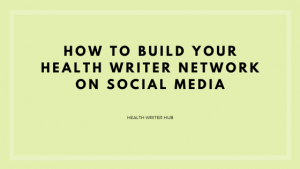 Networking during a pandemic is challenging for health writers, whether we want to apply to full-time jobs or generate leads for freelance work. When in-person events are cancelled or turned into Zoom meetings, one-on-one connections are harder to find.
Networking during a pandemic is challenging for health writers, whether we want to apply to full-time jobs or generate leads for freelance work. When in-person events are cancelled or turned into Zoom meetings, one-on-one connections are harder to find.
Luckily for you, health writers are expert social media networkers who have years of outreach experience. A writer who you meet on social media could lead to your first freelance job or help you find your writing niche, so don’t hesitate to make a connection.
Say hello to strangers – respectfully
In the past six months, I grew my LinkedIn connections from 200 to 2000. My outreach was intentional and specific to my path, and it improved my understanding of medical writing career options. If I can do it, so can you.
LinkedIn has official advice for networking, but the two most important tips are to be specific and be respectful. Take a few minutes to read a profile or browse a website before reaching out. If you approach a new person with knowledge of their work, they are much more likely to respond.
You can easily make a good impression by crafting a quick message with a few personal details that genuinely resonate with you.
- Mention a project they worked on – copywriters usually have examples of their work on a website, so pick one that you like.
- Refer to an organization you both belong to – a positive observation about an organization they are involved in can be a great icebreaker. Are you a member of a medical writing, editing, or journalism organization yet?
- Ask about an interesting job they had – maybe you are curious about plain language in healthcare, and they happen to be an expert. Ask them about it.
- Ask for one piece of specific advice – are you trying to figure out how to get better at letters of introduction? Ask the expert.
It also helps to offer something in return, even if that offer is just a willingness to network on their behalf in the future.
Use Facebook groups as a writer networking tool
Facebook is full of groups that cover various health writing topics, such as content marketing and health journalism.
- Public groups vs private groups – private groups are more likely to provide insider career information and exclusive invitations to events while public groups tend to be very hit or miss.
- Sign-up forms – when you find a Facebook group that you would like to join, make sure to answer every single question on the sign-up form provided. A lot of groups will not admit you otherwise.
- Identify the group’s goal – remember that most Facebook groups have a goal like selling a book or finding new clients, so make sure that you are aware of the group’s purpose when you join. Notice whether group posts encourage community and professional development or only focus on selling.
- Learn the rules and follow them – once you are in a Facebook group, read the rules to make sure you don’t post something that advertises your services or showcases your published work on the wrong day. That could get you kicked out.
Interact with influencers
Two writers I enjoy following on LinkedIn that give a lot of free, actionable advice are John Espirian (a copywriter) and Peter Llewellyn (a medical writer).
Social media influencers intentionally use their large platforms to create a community in addition to selling their service. You can feel free to use their LinkedIn and Facebook posts as a place to network and learn.
Respond to a popular post with your relevant, personal story, or answer a question in the comment section. Try it a few times, and see if a networking opportunity arises from the interaction.
Talk to your new writer network
Joining groups and interacting with posts is a good strategy, but you can take it one step further and ask for a call. It doesn’t hurt to ask even though not everyone will say yes. I have had several helpful networking phone calls with LinkedIn connections.
After watching a webinar about patient engagement, I reached out to one of the presenters on LinkedIn. We had a great phone conversation, which led to a referral that connected me to a hiring manager. That freelance medical copyediting job was not listed publicly, but I got to hear about it.
A medical writer I had never met responded to my message with an interview opportunity, and we spoke about details on the phone. Now I know that I am qualified to be a medical copywriter, and I know what is involved in a writing test for that job.
There are several ways to successfully network with writers on social media, so you can try different things to find out what works for you. Let me know how it goes!
